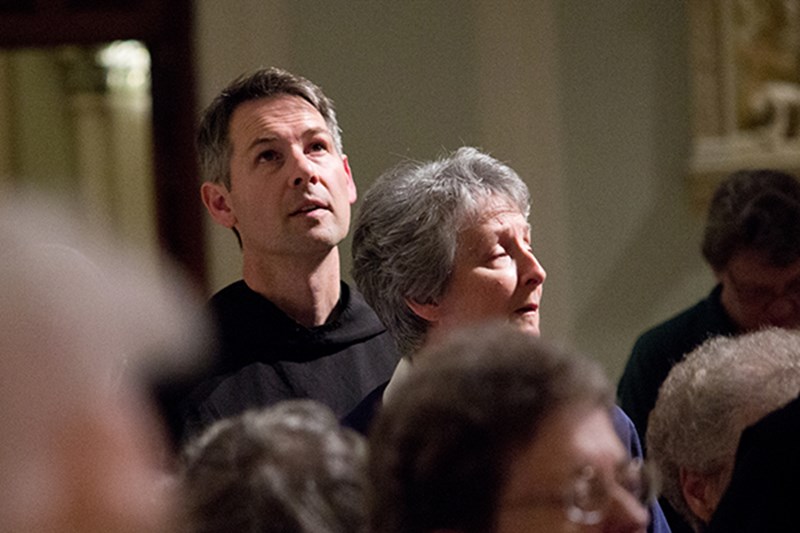Ordinary Prayer and Faith
Br. Francis Wagner, OSB
Thursday, July 1, 2021

Ask and you will receive, Jesus tells his disciples. However, he also says that we are to ask in accordance with his will: "If you ask anything of the Father in my name, he will give it to you. Until now you have not asked for anything in my name. Ask and you will receive, so that your joy may be complete" (John 16:23-24).
The liturgical seasons of Advent, Christmas, Lent and Easter provide us with much to anticipate and celebrate in terms of our Christian faith. Feasts and solemnities aside, for the most part we are called to find Christ in the day-to-day, unremarkable, ordinariness of human living. Can our joy be complete when things are more hum-drum than festive?
A passage from Mark's Gospel (9:14-29) offers some guidance in this regard, pointing us toward the importance of prayer and faith in our daily lives. Although it may be argued, on one level, that what Jesus does in this particular passage - healing a boy by expelling the demon tormenting him - is anything but ordinary, the overall message is one of entrusting everything to God through prayer and faith.
After all, demons such as doubt, despair, spiritual idleness and so many others are daily companions, tempting us to lose all hope in a God who seems absent or oblivious, as we aimlessly flail away, seemingly at the mercy of life's frustrations and disappointments.
Such is the scene at the outset of this Gospel passage. Things are out of control. A man has brought his possessed son to Jesus' disciples to be healed. However, regardless of what they try, nothing works. A fierce argument breaks out. This is the setting into which Jesus appears. After finding out what all the commotion is about, Jesus expresses exasperation with all of them. "You faithless generation, how much longer must I be among you? How much longer must I put up with you?"
But Jesus does not throw up his hands and simply walk away. "Bring [the boy] to me," he says. When this is done, the spirit possessing him flings the boy into convulsions. His father says to Jesus, "If you are able to do anything, have pity on us and help us."
Once again, Jesus is taken aback. "If you are able!" he retorts. "All things can be done for the one who believes." This is the key moment upon which the whole event turns. The father acknowledges his lack of faith while at the same time expressing an earnest desire for more faith. In other words, he prays.
"I believe; help my unbelief!" he says.
Jesus then expels the unclean spirit. Order is restored from chaos.
Later, when Jesus is alone with his disciples, they ask him why they were not able to do what he did. "This kind can come out only through prayer," he responds.
Prayer expresses our faith. Other things (such as works of mercy) do as well, but prayer is foremost because it acknowledges our need to be in right relationship with God - it is our relationship with God. Prayer is God's invitation to dedicate our time and being to a fuller appreciation of the divine, so that our vision broadens and our hearts expand with love. It is a lifelong rhythm of listening and responding to God's call for conversion of heart - personally and communally.
Prayer is not a means by which we attempt to persuade God to give us this or that, or to do this or that. It is open, honest, full-hearted conversation with a God who loves us beyond measure, so that we may become our true selves in the divine image. We pray to be changed into who God wishes us to be - not orphans, but children of God.
Jesus instructs us to pray always, so as not to lose heart (Luke 18:1). Many times throughout the gospels, after expelling a demon or healing someone, his parting words are: "Your faith has saved you." Wealth, honor, health, success and so many other things are all well and good, as far as they go. And as dutiful Christians, we may strive for perfection to the point of exhaustion.
But in the end, it is solely faith that saves us - faith in the unfathomable and ineffable mystery of God's indisputable and merciful presence in our lives despite what the world's values and circumstances seem to suggest. After all, as the Letter to the Hebrews famously states: "Faith is the assurance of things hoped for, the conviction of things not seen" (11:1).
So, we must pray as did the apostles, "Lord, increase our faith!"(Luke 17:5), or as did the possessed boy's father: "I believe; help my unbelief!" These are honest expressions of acknowledged incompleteness. In them, we state our desire to be freed from whatever holds us back from God. Even when we are in the grips of the deepest doubt, we can confidently pray for more faith.
"Ask and you will receive," Jesus says in John's Gospel. True faith is a gift that cannot be refused to the one who prays for it. In this way, we find Christ in the day-to-day, unremarkable, ordinariness of human living. "Remember," Jesus says, "I am with you always, to the end of the age" (Matthew 28:20).
So, let us pray - this day and every day, all day and for all days. Everything is possible to one who has faith - even grasping what seems just beyond our reach. Faith is what completes our joy, and as Christians, that is anything but ordinary.